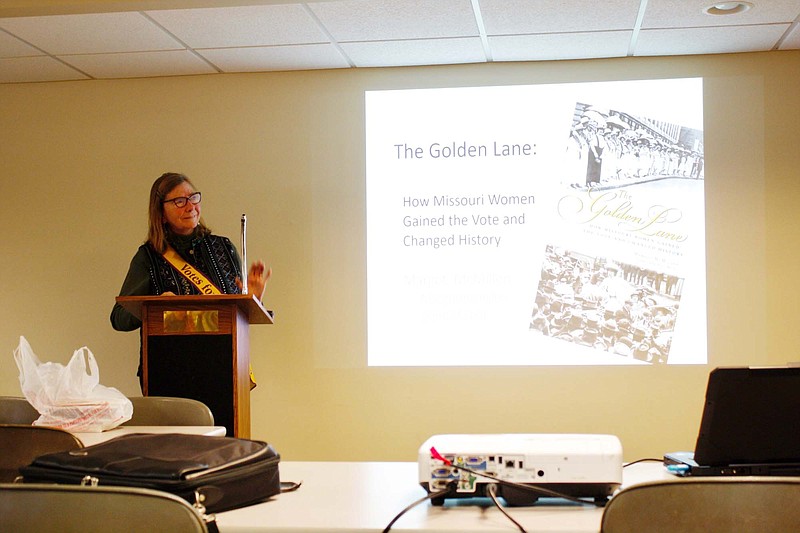Local author Margot McMillen lectured Tuesday afternoon at William Woods University to celebrate the 100th anniversary of women's suffrage in Missouri.
Her lecture focused on her 2011 book "The Golden Lane: How Missouri Women Gained The Vote And Changed History." The book details the story of a peaceful protest in St. Louis during the 1916 Democratic National Convention.
"The 'golden lane' is perhaps the very first nonviolent protest in the world that was not connected to a religious organization," McMillen said.
During the protest, thousands of women lined the streets of downtown St. Louis with yellow parasols and yellow sashes that read "votes for women." McMillen donned a replica sash during her lecture.
The lecture was a part of WWU's fourth annual diversity and equality symposium. Symposium founder Mary Mosely, a former Spanish professor at WWU, wanted to focus this year's symposium on women's voting rights.
"So many people don't know about the ('golden lane') and I didn't even know about it until (McMillen) started researching the topic," Mosely said.
McMillen worked as an English professor at Westminster College before retiring. During her introduction, she was described as an "activist, farmer and author."
"I figured (McMillen) would fit the topic perfectly, and because she's local, I thought we'd have a good chance at getting her," said Mosely, who also wrote the foreword for McMillen's book.
McMillen noted other woman through history that impacted the women's suffrage including Joan of Arc, Abigail Adams, Sojourner Truth and Virginia Minor. Minor was a women's suffrage activist in St. Louis in the 19th century, and after being denied an attempt to register to vote she brought the case to the United States Supreme Court, where she lost.
"One of the things we can learn from Virginia Minor and (other important women in history) is that you just don't give up," McMillen said.
McMillen also touched on the various risks the women that fought for their suffrage faced. Outside of having an "angry husband," McMillen said women could be stripped of their home and children according to the law if they ventured outside of the domestic sphere.
"The law was that if (a woman) didn't have a man supporting them, then their children were at risk and could be taken from them," McMillen said.
McMillen cites the protests as having helped secure the passage of the 19th amendment, which secured voting rights for women.
McMillen said women have "outvoted" men in every midterm election since 1986 and every general election since 1980. She also cited how unmarried women made up 26 percent of registered voters in the United States.
"The question is, 'can women voters change the world?'" McMillen said.

